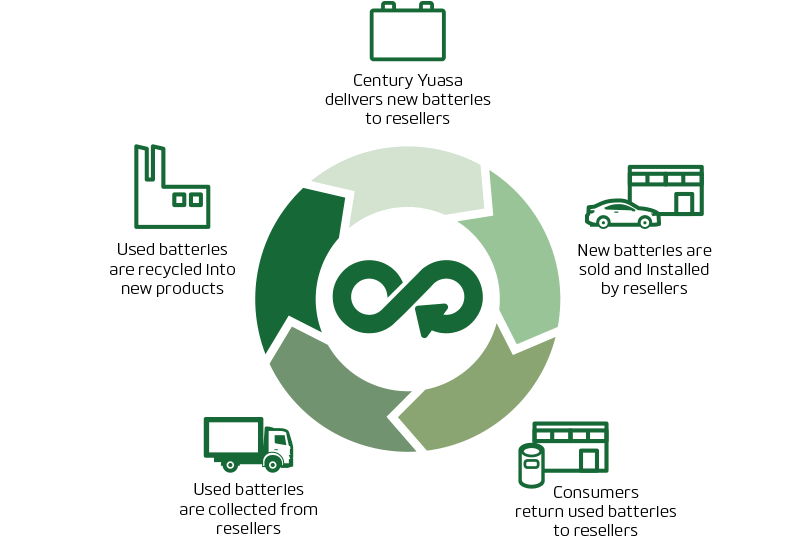Our Mission
At Century Yuasa we are committed to minimising our impact on the environment through a circular economy approach to manufacturing by keeping resources in use for as long as possible and recover the value of materials and products through recycling and reuse.
By doing this we aim to achieve economic, environmental, and social benefits through reducing waste and conserving resources.
- Use of recycled lead in Century Yuasa’s batteries. Saving the earth’s resources by using recycled materials.
- Circular flow of resources instead of continuing to extract the earths natural resources.
- Minimise & take care of the waste from our production plant.
- 98% of a battery is recyclable only a very small amount goes into landfill.
Find a recycling centre
Why Recycle Used Lead-Acid Batteries?
Recycling used lead-acid batteries (ULABs) is essential for environmental protection and resource conservation.
ENVIRONMENTAL & SAFETY BENEFITS
Lead-acid batteries contain lead and sulfuric acid, which are toxic and harmful to the environment, if not properly managed. Lead can be ingested if handled and sulfuric acid can cause burns if in contact with skin. Recycling helps prevent these hazardous materials from coming into contact with humans and being released into the environment, reducing soil and water pollution.
RESOURCE CONSERVATION
Lead is a finite and valuable resource. By recycling lead-acid batteries, we can recover and reuse lead, reducing the need for mining and the associated environmental impacts. Recycling also conserves other materials used in batteries, such as plastic and sulfuric acid.
How a Battery is Recycled?
98% of a lead-acid battery can be reclaimed through recycling. The lead, plastic and acid components are re-processed and manufactured into an array of other products including guide posts, cabling and detergents.
- Sulfuric Acid - Sulfuric acid is converted to sodium sulfate to be used in the manufacture of glass, textiles, laundry detergents and fertilisers.
- Lead - Battery plates, inter cell connectors and posts made from lead are melted down in a smelter furnace. The molten lead is then formed into ingots for re-use.
- Polypropylene - Battery containers and lids are chipped and sent for recycling into rubbish bins, plant pots etc

Benefits of recycling
- Help build a cleaner Australia for future generations
- Prevent harm to humans and wildlife
- Protect the environment
- Conserve natural resources
- Reduce the amount of waste to landfill
 Homepage
Homepage
 Homepage
Homepage
